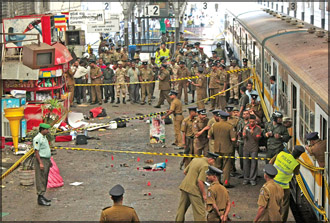Suicide bombings: An evil phenomenon
Sriram KHE
Iraq and Sri Lanka are thousands of miles apart and have distinct
cultures, but they have at least one thing in common: suicide bombing.
Persian and Arab maritime explorers gave Sri Lanka the name Serendip,
because of how this enchanting land suddenly came out of nowhere. It was
from the same idea that, centuries later, Sir Horace Walpole coined the
word “serendipity” to signify something fantastic that we chance upon
while searching for something else.
|

Evil strategy: Last Sunday’s blast at Fort Railway Station |
These days, Sri Lanka is often in the news because of a 25-year-old
conflict that does not seem likely to end anytime soon.
A Sri Lankan graduate student was my first apartment-mate when I came
to the United States. The few events that he shared with me - such as
stories of his friend literally jumping over walls and fleeing mobs that
were torching buildings and killing people - seemed Hollywoodesque.
Sadly, they were real.
As the regional big brother, India attempted to mediate a solution in
1987. It sent a military contingent to Sri Lanka to oversee the
disarming of the rebels and to ensure that the government would hold to
a Ceasefire Agreement - one of many over the years.
As has been the case with many countries that have attempted to
straighten out another country’s affairs - an experience we in the
United States know all too well - the Indian Peacekeeping Force itself
came to be seen as the bad guys and found itself fighting the rebels,
known as the Liberation Tigers of Tamil Eelam (LTTE).
The dramatic turnaround from peacekeeping to direct conflict did not
go well - neither in India nor in Sri Lanka. The shift in India’s role
led a friend from my undergraduate days, who was then an officer in
India’s air force, to quit the military in the middle of his contract,
fully aware that he would lose all the benefits he had accrued over the
years.
The lack of support all around led Indian forces to start packing
their bags a little more than two years after the first deployment.
However, the departure of the Indian forces apparently did not do enough
to unlink India from the rebels, who continued to harbor ill feelings
toward the Indian government.
In May 1991, an LTTE suicide bomber detonated a powerful blast that
killed the former prime minister of India, Rajiv Gandhi, who had
authorised the peacekeeping mission.
At a campaign event, the female bomber approached Gandhi to touch his
feet, not an uncommon act in India, and set off the explosive.
Thus, reports of suicide bombers in Iraq always remind me of Sri
Lanka and the LTTE.
|

Terror attack: Minutes before the powerful blast that killed the
former Prime Minister of India, Rajiv Gandhi |
Though the LTTE did not invent the idea of suicide bombing, this
group perfected the insanely evil strategy of using people, and women in
particular, as bomb delivery mechanisms. According to some estimates,
more than a third of LTTE suicide bombers are female.
The latest was on February 3, a day before the 60th anniversary of
the country’s independence from Britain. A female suicide bomber set off
explosives, killing herself and 14 people at the main railway station in
Colombo, the country’s capital.
Compared to the Sri Lankan civil war, the chaos in Iraq appears to be
even more intense and widespread. From my rudimentary understanding of
the Sri Lankan situation, I had always feared that it would be only a
matter of time before militants in Iraq started using female suicide
bombers in large numbers.
Last week brought a horror of the lowest order when Iraqi militants
reportedly used two mentally handicapped women as bombers.
It is difficult to see the silver lining in such dark clouds over Sri
Lanka or Iraq. In his own way, Rodney King summarised it best during the
riots in Los Angeles in 1992: “Can’t we all get along?” I hope the
answer to this rhetorical question is something far, far better than
suicide bombers.
Sriram Khe of Eugene is an associate professor and director of the
honors programme at Western Oregon University in Monmouth, US |

